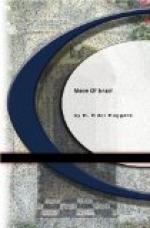Taking a Hebrew lad to run before the horses as our guide, we drove to the banks of a canal where the Israelites made bricks of mud which, after drying in the sun, were laden into boats that waited for them on the canal and taken away to other parts of Egypt to be used on Pharaoh’s works. Thousands of men were engaged upon this labour, toiling in gangs under the command of Egyptian overseers who kept count of the bricks, cutting their number upon tally sticks, or sometimes writing them upon sherds. These overseers were brutal fellows, for the most part of the low class, who used vile language to the slaves. Nor were they content with words. Noting a crowd gathered at one place and hearing cries, we went to see what passed. Here we found a lad stretched upon the ground being cruelly beaten with hide whips, so that the blood ran down him. At a sign from the Prince I asked what he had done and was told roughly, for the overseers and their guards did not know who we were, that during the past six days he had only made half of his allotted tale of bricks.
“Loose him,” said the Prince quietly.
“Who are you that give me orders?” asked the head overseer, who was helping to hold the lad while the guards flogged him. “Begone, lest I serve you as I serve this idle fellow.”
Seti looked at him, and as he looked his lips turned white.
“Tell him,” he said to me.
“You dog!” I gasped. “Do you know who it is to whom you dare to speak thus?”
“No, nor care. Lay on, guard.”
The Prince, whose robes were hidden by a wide-sleeved cloak of common stuff and make, threw the cloak open revealing beneath it the pectoral he had worn in the Court, a beautiful thing of gold whereon were inscribed his royal names and titles in black and red enamel. Also he held up his right hand on which was a signet of Pharaoh’s that he wore as his commissioner. The men stared, then one of them who was more learned than the rest cried:
“By the gods! this is his Highness the Prince of Egypt!” at which words all of them fell upon their faces.
“Rise,” said Seti to the lad who looked at him, forgetting his pain in his wonderment, “and tell me why you have not delivered your tale of bricks.”
“Sir,” sobbed the boy in bad Egyptian, “for two reasons. First, because I am a cripple, see,” and he held up his left arm which was withered and thin as a mummy’s, “and therefore cannot work quickly. Secondly, because my mother, whose only child I am, is a widow and lies sick in bed, so that there are no women or children in our home who can go out to gather straw for me, as Pharaoh has commanded that we should do. Therefore I must spend many hours in searching for straw, since I have no means wherewith to pay others to do this for me.”
“Ana,” said the Prince, “write down this youth’s name with the place of his abode, and if his tale prove true, see that his wants and those of his mother are relieved before we depart from Goshen. Write down also the names of this overseer and his fellows and command them to report themselves at my camp to-morrow at sunrise, when their case shall be considered. Say to the lad also that, being one afflicted by the gods, Pharaoh frees him from the making of bricks and all other labour of the State.”




